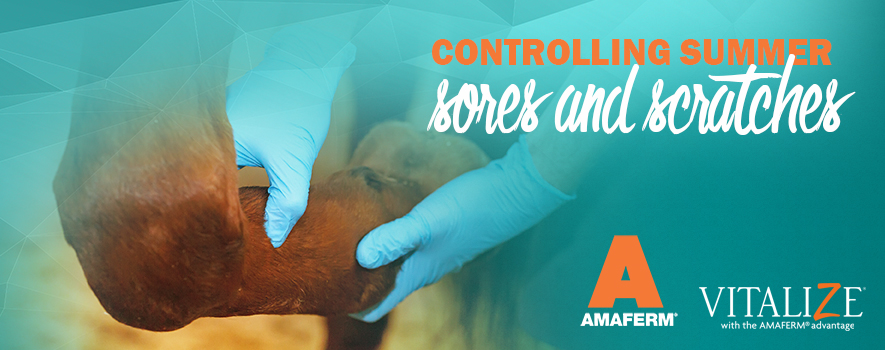Scratches and summer sores are two common skin conditions that often become prevalent when horses are in warm, damp conditions. Let’s discuss the differences between these two ailments and how each should be treated.
Scratches is a relatively common condition that is caused by bacteria, fungi, or parasites. It results in enlargement of the affected skin cells and oozing and scabbing of the affected area. Commonly affected areas include the pastern and fetlock. Although the cause varies by case, horses in wet or muddy conditions are most prone to developing scratches. Treating scratches requires a bit of diligence to keep the legs clean and dry. First, if the hair on the legs is long, clipping it will help keep the leg dry and clean and allow you to apply medication to the scratches. However, be careful when clipping the leg as the scratches may be sensitive to the touch. Next, thoroughly clean the area with an antibacterial soap and towel dry the area. To further dry the leg, you can apply baby powder to absorb moisture. Once the area is dry apply a topical cream to help heal the scratches. The best treatment for persistent scratches is usually a mixture of topical antibiotics, antifungal agents, and a steroid cream. This can be prescribed by a vet.
Summer sores are skin lesions caused by parasites, specifically by a species of horse stomach worms called Habronema. These worms pass their larvae thru horse manure, which are eaten by flies and transmitted back to the horse. These larvae are deposited on abrasions, wounds, or near moist areas of the body and cause a sore with extreme itching and pain. Again, keeping the area clean and dry is the first step of treatment. Treating summer sores can be difficult and they rarely heal on their own. A topical anti-inflammatory is usually helpful, but antibacterial and antifungal agents won’t cure the sore. If the sore is severe, excess tissue that has formed around the sore may have to be removed by a vet. In order to help heal a summer sore, and to prevent them from occurring, horses should also be treated with ivermectin to eliminate stomach worms and an adequate fly control program should be followed. To learn more about fly control, see our blog.


